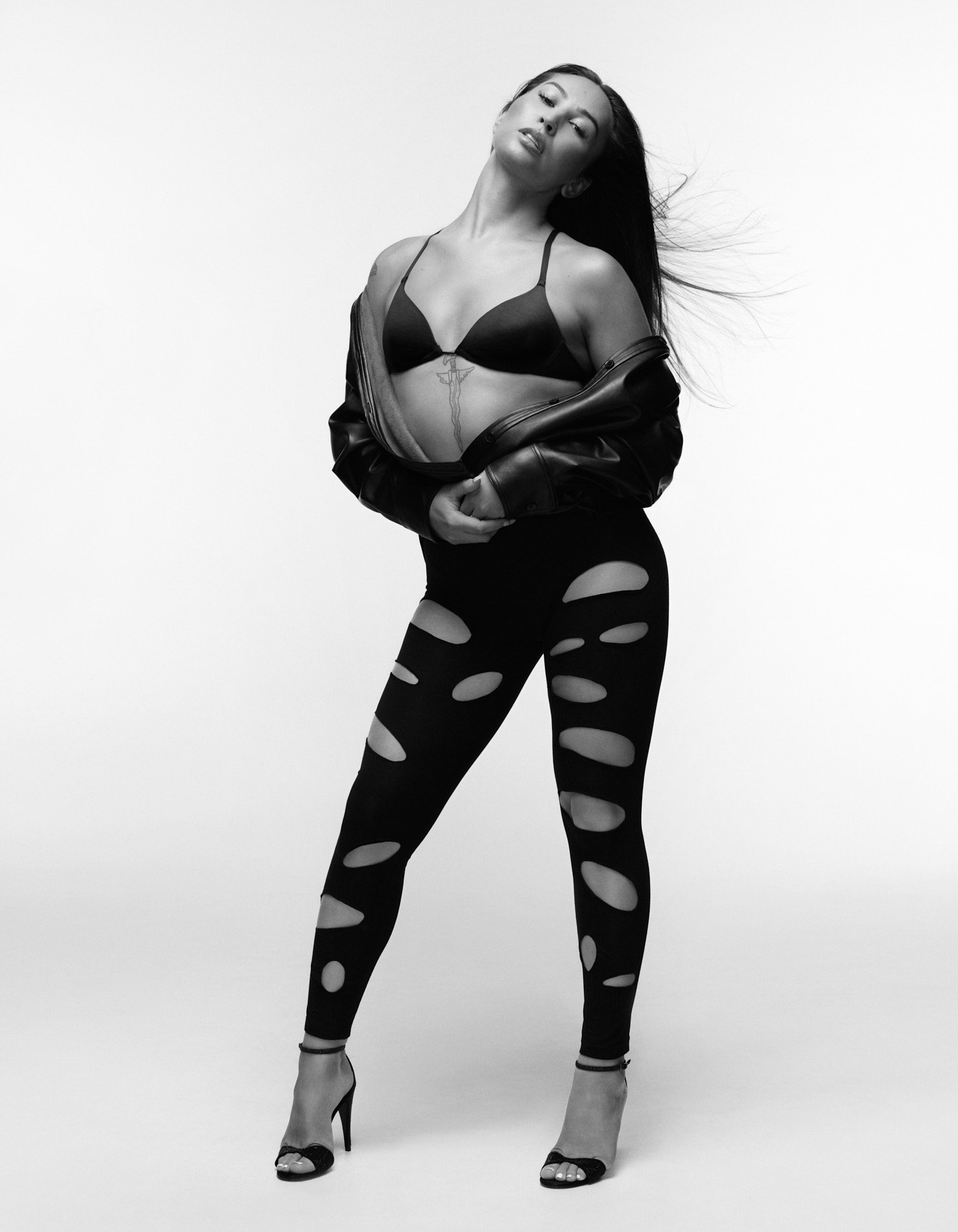Marcus Leslie Singleton in conversation with Tschabalala Self
The two artists talk about inspirations, success and hopes for the future.
This story was originally published in Justsmile Issue 1 FW20.
Photography Don Brodie
Text Erin McFadyen
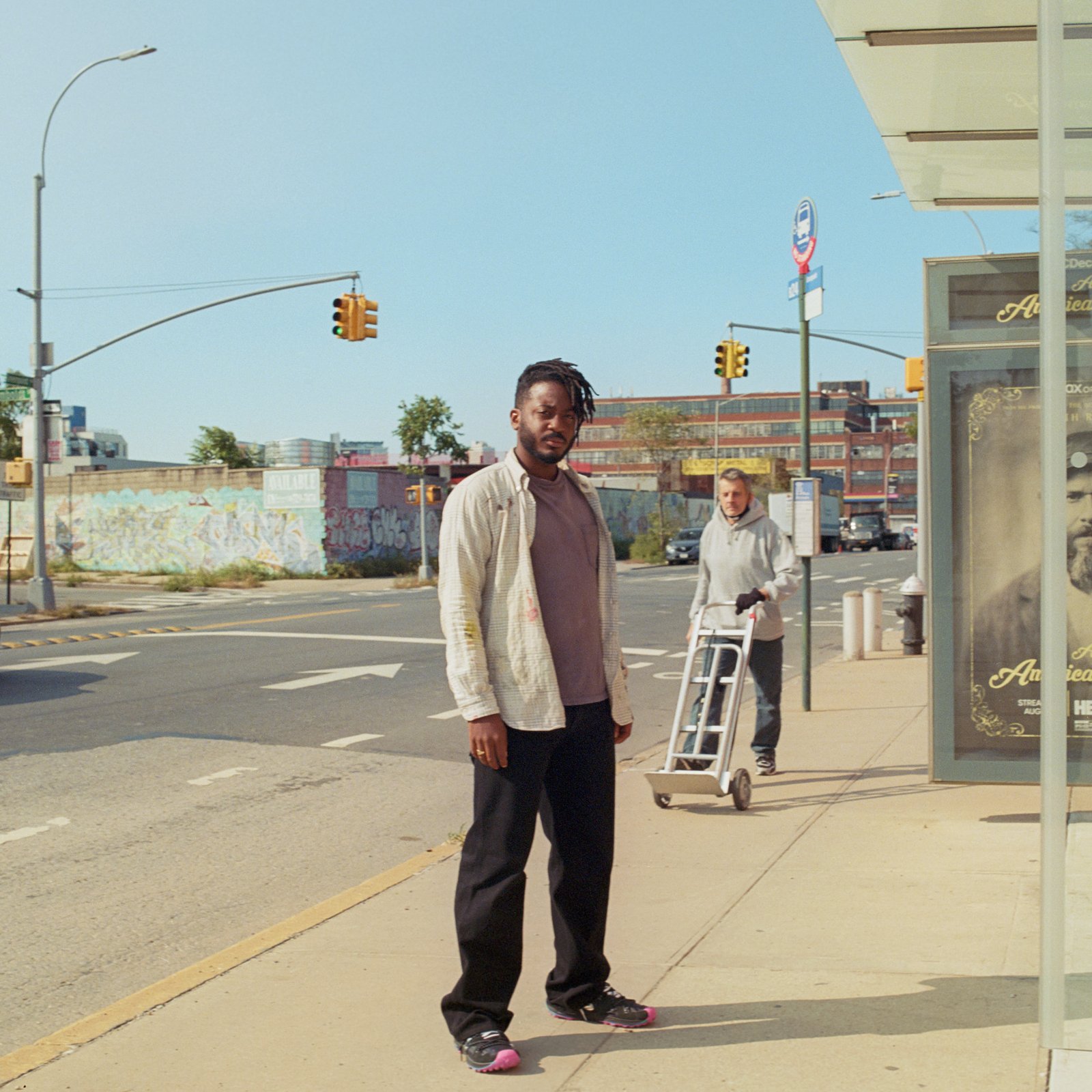
Marcus Leslie Singleton’s paintings use color and space to make the events of contemporary political life atemporal; to investigate the enduring emotional, intellectual, and experiential conditions that lie beneath the stories of our lives. Though occasionally offering recognizable scenes of political life — painting images of police brutality, for example — Singleton deals equally in the everyday. Much of his works show friends in conversation, people alone in their homes on their phones, together sharing a meal, at play, or laying in bed.
Beyond any minimal content, though, Singleton is interested in the emotional and energetic resonances that his expressionistic use of color and shape can create. He elicits an affective response from the viewer, and prioritizes the imagining that art makes possible: he aims to step from the familiar Black monolith and define Blackness from an unknowing, atemporal space, as blank canvas. Aiming to ‘widen the peripheral of what this time means to us and our spirits,’ in his own words, the artist sets out to begin conversations and inquisitions not only for his audience, but within himself. He speaks with artist, Tschabalala Self for Justsmile.
‘As artists our work is protest in itself in a way; we live as a protest.’
Tschabalala Self: Can you tell us a little bit about where you’re from?
Marcus Leslie Singleton: Yeah, I was born in Seattle, Washington - born and raised there. I moved to New York in 2013, when I was 23, to pursue painting and just living in a different place. I was thinking about moving to like LA, but I thought that would be so cliché and also so close to home, and I wanted to go somewhere completely different. New York seemed like an interesting place and a challenging place. I like challenges; so I thought I’d just give it a shot. I ended up loving it.
TS: So when you first moved to New York, what was your first introduction into the arts community?
MLS: That’s a good question. My move to New York was really propelled by the fact that there was such a strong arts culture here. I was interested in street art, so when I moved here that’s what I was doing. I was spray painting poetry, and then I started to make work that was more insular inside. When I started doing that, I started to check out galleries.
Mike Kelley was one of the first shows I remember going to. I remember during the first couple weeks when I came to New York, I went to the Mike Kelly show at Skarstedt. And it was so good. It wasn’t what I was expecting. I was expecting paintings, but that show was all these notebook drawings of his and he was drawing really hilarious tongue-in-cheek jokes.
TS: Who are some of the other artists that you admire, or who you look up to?
MLS: Well, let’s just get this out of the way: of course, you. I’ve told you this but I saw your show at the Hammer Museum in LA–that was cool. I used to look at a lot of photography, a lot of African photographers and African American photographers like Kwesi Abbensetts, who I still am in touch with. He’s cool. And Jamel Shabazz, I was looking at his work a lot. Micaiah Carter. As far as painting goes, I was looking at a lot of John Rivas, Curtis Santiago, Emma Kohlmann, Lynette Yiadom-Boakye and Chris Ofili’s work.
TS: Oh, yeah. Last night I was looking at his most recent show, and also looking up my favorite show I ever saw in person – his show at the New Museum.
MLS: I missed that. I was so sad I was out of town.
TS: It was good! I’m always impressed with how he was able to move from more assemblage paintings, to oil painting.
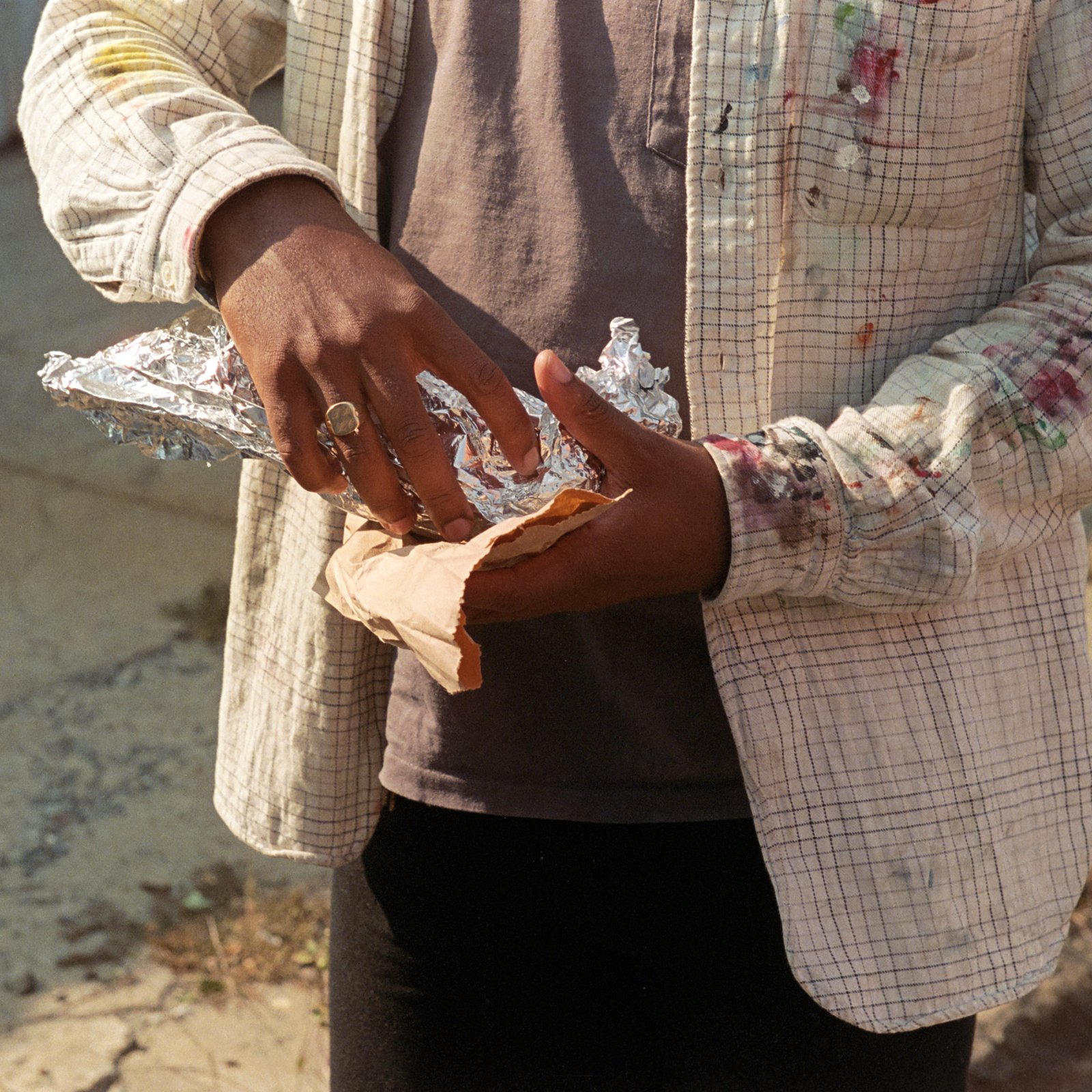
MLS: Do you ever think about changing medium, maybe trying to do watercolor or something like that?
TS: When I first started painting, I was doing oil paintings like in school. I imagine maybe when I’m much, much older, I’ll return to oil paintings.
MLS: That’d be cool. I’d be excited to see your oil paintings. Chris Ofili is a big one; he’s a big, big influence on my work. Then there’s this artist that’s actually from Seattle, and I grew up with him. His name is Eric Salisbury, he’s a family friend. Him and my mom used to make pottery together; she would make the pottery, and he would paint his motifs on it.
TS: Your mom was into ceramics?
MLS: Yeah. She was a creative person too. She was one who said I should take my painting seriously, because she liked it. She would make these ceramics, jars and bowls and plates, and he would paint on them. One time she made these plates, they were really nice; black. I painted on them – she was like ‘what happened to my plate?’ I painted on them with this acrylic paint. I was definitely not supposed to paint on those. But I was like, ‘Eric paints on all these plates all the time!’
TS: Are there any other creative people in your family? Other than you and your mother?
MLS: My dad actually was a painter. He gave up; he doesn’t paint anymore. He did photography. He painted and he played music – and he still plays music but he stopped painting in the 80s. He was working in figuration.
He would paint Bruce Lee, he would paint Muhammad Ali. So, I grew up in a pretty creative household, but when I was a kid, I wanted to go to the NBA.
TS: Ok, so I feel like we’ve got a sense of what brought you to New York, and your first experiences in New York. What has this year, 2020, been like for you in the city?
MLS: One major thing that I’ve noticed during 2020, especially in New York City, is how many people have moved away from the city, or have taken a break from the city. A lot of my friends, and a lot of people that I know, have just left and went to other cities to live. Especially people with families that aren’t from New York, I think they felt like it would be better to be close to their families during the pandemic. And I felt the same way. But I also feel like New York is home. My whole thing was in New York. So even though my family’s not here, it would have never crossed my mind to leave. During lockdown, that was crazy; you remember that two week lock down where you could only go to the grocery store? The curfew was very surreal. And you’re forced to really self-analyze. That was another major thing: the self reflection aspect of it. Also I had a lot of time to work, so I was able to open a show at Journal Gallery on October 8 and a show at Steve Turner on the 17th.
There are also politics to consider this year. I remember going to about four protests, and I don’t normally protest. I think they matter, but as artists our work is protest in itself in a way; we live as a protest.
TS: So the show at Steve Turner, what are you addressing in that?
MLS: That show has to do with African American history, and it deals with spirituality, religion, and technology in a way: how technology has been a tool for better and for worse. There’s environmentalism - it touches on a lot.
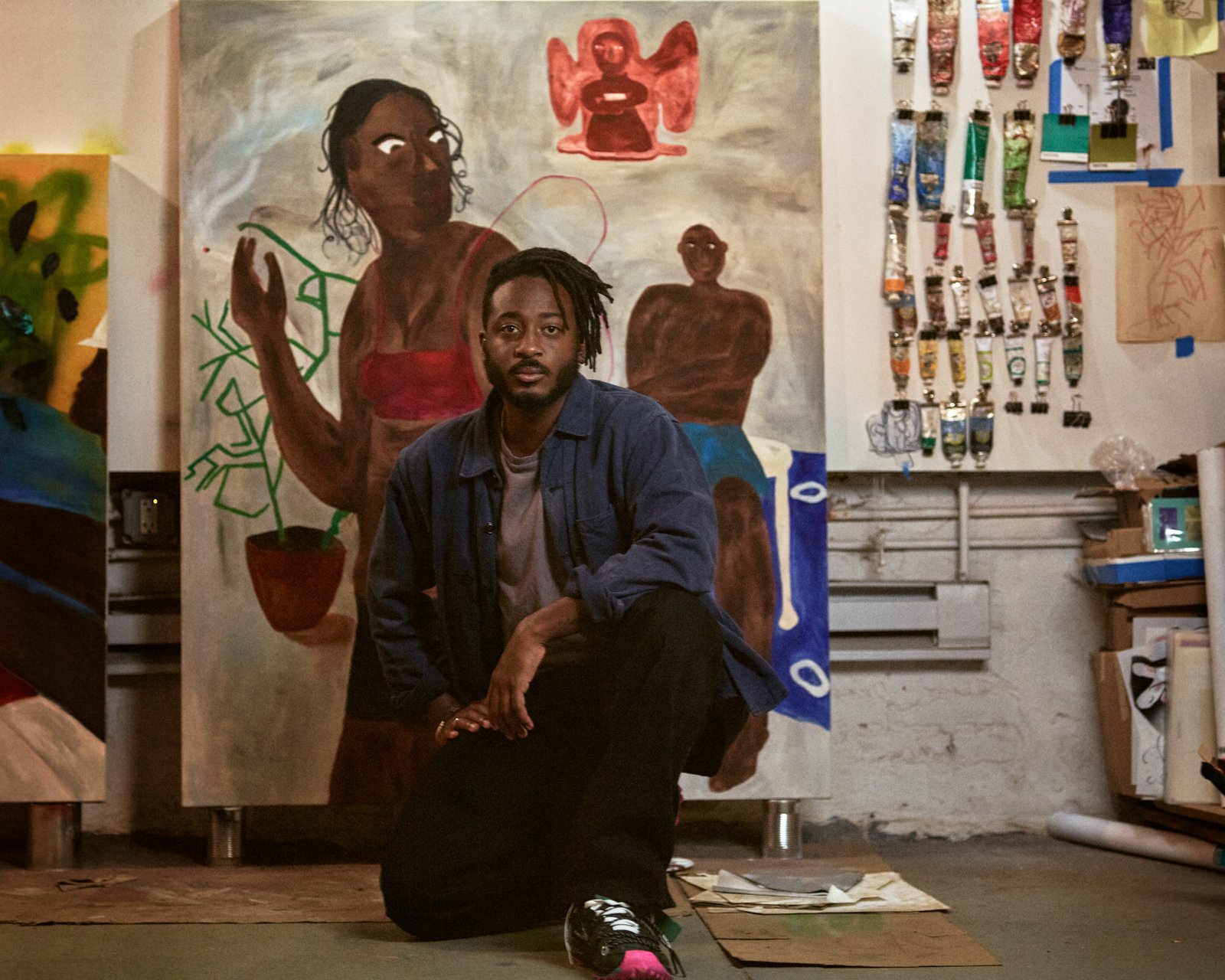
TS: Are there any particular books you’re reading at the moment? Are there any particular films, podcasts or albums that’ve made a particular impact on you during the summer months?
MLS: I’ve been listening to a lot of music; I always listen to music. There’s this rapper, MIKE, that I like: he’s a native Brooklyn rapper and his music is his experimental hip hop, and I love it. It sounds cool, sonically, but also I think of the lyrics as paintings. They’re kind of portraits, almost.
I’ve been rewatching The Matrix. I am a little freaked out by it, because I feel like this [the movie] was low key calling on AI and all that. The film talks about how we invented AI, and then they took over humanity a century later, you know?
TS: Yeah. Could it be this idea of human beings as a source or a resource?
MLS: Yeah, exactly. Like a cow: a cow makes milk for humans, and humans make...something for AI, perhaps?
Then there’s this book I’ve been reading. It’s called The Future of Black Radicalism. It features quotes from Cedric J. Robinson, and it’s almost like a compilation book.
TS: You’ve acknowledged that it’s been a challenging year, what has been keeping you going through these tough times, these unprecedented times?
MLS: My friends and family; I cannot stress how important community is. Just to have good people around you, it makes all the difference. I can’t imagine how it would be going through this pandemic- and the most tumultuous time in world history, maybe- without community. So friends and family definitely, and then just kind of still having a sense of communion; hanging out.
TS: It seems like you have had the opportunity this year to have a number of shows lined up and the shows have been well received. I heard through the grapevine that your most recent show sold out. So you’ve been having a lot of success, how are you dealing with success? And what exactly does success mean, for you?
MLS: Success is different for everybody. For me, it’s being able to pay my bills, have enough money to live comfortably, and when I have kids for them to live comfortably, and have an apartment and maintain a studio, while making work. That’s really important to me, because my practice is really important to me. So if people are receptive to that, then that really means a great deal to me. It’s kind of scary to say, ‘okay, I’m gonna take this risk and do it.’ Then when it actually works out, that in itself is a success. So yeah, taking risks, and then sticking to it, even when the pressure’s on, that’s a good feeling.
I’m a pretty private person, so it’s not like ‘I sold a painting, I’m gonna go out and go to the strip club’ or something. It’s more like ‘okay, thanks. Maybe I have more in my savings account now.’
TS: I just want to ask you one last question, to wrap things up. Tell me a little about what you hope for in the next year – what you hope it will look like for you personally, but also for the world.
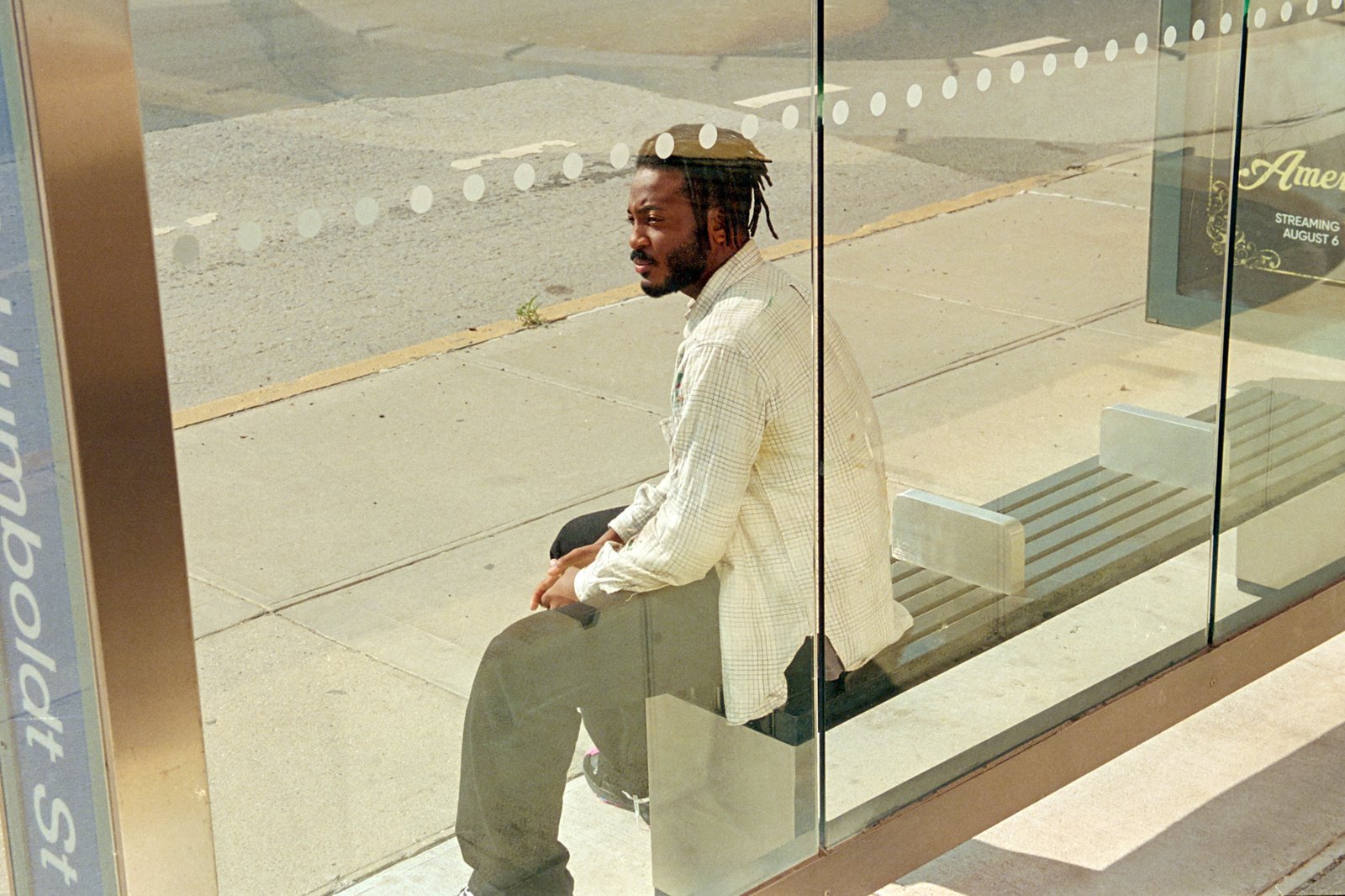
MLS: Alright, I’ll start with the world first, because it’s been on my mind lately. I hope we find a way to actually love one another; regardless of whether you’re left or right, white or Black. I think this year has definitely shown us that when people come together, amazing things can happen. At the moment we have, unfortunately, a president who seems he dislikes that notion: He wants to divide and conquer, and he wants power. I want to be realistic here. I don’t think it will happen next year. But what I hope is more people start to adopt a more worldwide lens of, ‘we’re not the only people that matter on this earth, and for us to keep on living and sustain, we have to kind of love our neighbors.’ It might come later, but it’s going to happen. I hope people realize that, and I hope people start to be more accepting and loving and patient with one another. Us as artists, we are already different on an atomic level; we think to problem solve, everything’s already different. But I think, if you could do it, and I can do it, and other people can do it in their own way, then we all can become more loving towards one another. I think art plays a big part in that.
Then personally, I would love to do more residencies, and I would like to do more institution and museum shows. I’d also like to get to be a better painter; I need to fine tune. I want to introduce some type of other media- somehow use watercolor and oil together through cut and pasting-I would like to introduce a new element to my work.
TS: Can you send a copy of this to me? I’ll save it for my archive.
MLS: Yeah. It’s good talking to you, always good just catching up with you.
TS: Let’s hang out in real life soon.
MLS: We will. I’ll see you.
